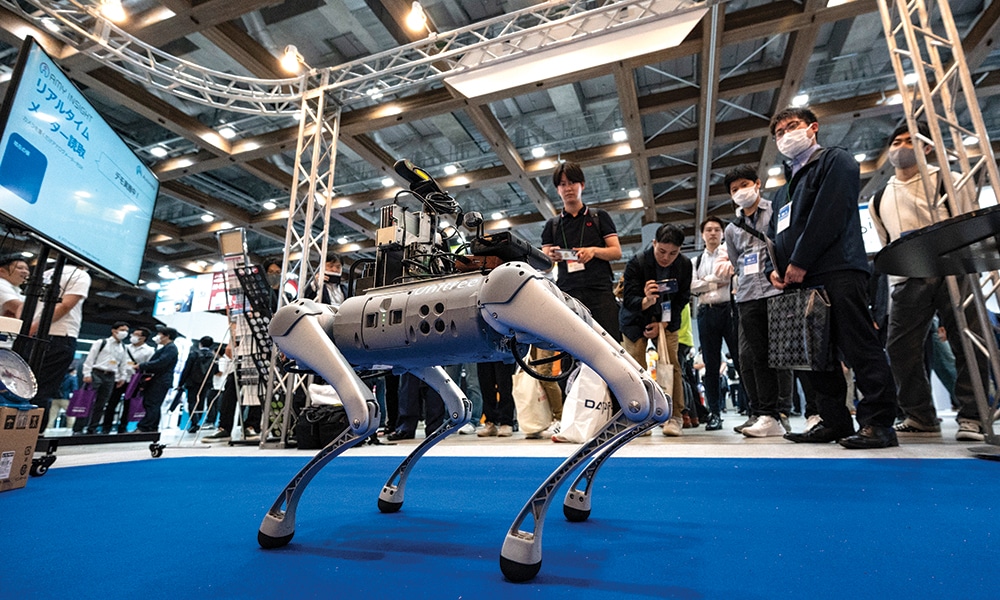TAIPEI: Nvidia chief Jensen Huang said the world was at "the tipping point of a new computer era” as he unveiled a raft of AI-related products Monday in his first public speech in four years at a Taiwan tech trade show. The US firm, which specializes in chips coveted in the artificial intelligence boom, saw its value surge to nearly $1 trillion last week, after the company’s quarterly earnings report blew past expectations. Nvidia is known for creating graphics chips long coveted by gamers but which have become engines for the kind of complex processes involved in artificial intelligence, known as accelerated computing.
Its chips are a central ingredient to the generative AI revolution, capable of delivering the computing heft needed to churn out complex content in just seconds from data centers around the world. In Taipei on Monday, the Taiwanese-American CEO expressed excitement to be back at the Computex forum, one of the largest trade shows for the sector. "Our first live event in almost four years! I haven’t given a public speech in four years — wish me luck!” he said.
Huang’s two-hour presentation introduced a dizzying host of new products — including an AI supercomputer platform called DGX GH200, which he said is now "in full production”. "We’re so excited that Google Cloud, Meta and Microsoft will be the first companies in the world to have access,” he added. "They will be doing be doing exploratory research on the pioneering front, the boundaries of artificial intelligence, with us.” The new supercomputer will — in theory — help the tech industry as it seeks to create more AI-related products, which require more complex computing tasks.
"This is really one of the first major times in history a new computing model has been developed and created,” he said, referring to accelerated computing. "We have now reached the tipping point of a new computing era.” Founded 30 years ago by Huang, Nvidia was initially a star in the video game world. The Silicon Valley-based company has since built its reputation on making graphics processing units (GPUs), which ramp up image quality and vanquish response lag time for gamers. Its shares soared more than 25 percent Wednesday after an earnings report showed the AI trend is fuelling demand for its sophisticated chips.
Calming job loss fears
Meanwhile, the boss of OpenAI, the firm behind the massively popular ChatGPT bot, said that his firm’s technology would not destroy the job market as he sought to calm fears about the march of artificial intelligence (AI). Sam Altman, on a global tour to charm national leaders and powerbrokers, said in Paris that AI would not - as some have warned - wipe out whole sectors of the workforce through automation. "This idea that AI is going to progress to a point where humans don’t have any work to do or don’t have any purpose has never resonated with me,” he said.
Asked about the media industry, where several outlets already use AI to generate stories, Altman said ChatGPT should instead be like giving a journalist 100 assistants to help them research and come up with ideas. ChatGPT burst into the spotlight late last year, demonstrating an ability to generate essays, poems and conversations from the briefest of prompts. Microsoft later laid out billions of dollars to support OpenAI and now uses the firm’s technology in several of its products - sparking a race with Google, which has made a slew of similar announcements.
Altman, a 38-year-old emerging star of Silicon Valley, has received rapturous welcomes from leaders everywhere from Lagos to London. Though earlier this week, he seemed to annoy the European Union by hinting that his firm could leave the bloc if they regulate too severely. He insisted to a group of journalists on the sidelines of the Paris event that the headlines were not fair and he had no intention of leaving the bloc - rather, OpenAI was likely to open an office in Europe in the future.
‘Exhausting’
The success of ChatGPT - which has been used by politicians to write speeches and proved itself capable of passing tough exams - has thrust Altman into a global spotlight. "Years from now, reflecting on this will feel very special... but it is also quite exhausting and I hope life calms down,” he said. OpenAI was formed in 2015 with investors including Altman and billionaire Twitter owner Elon Musk, who left the firm in 2018 and has repeatedly bashed it in recent months.
Musk, who has his own AI ambitions, said he came up with the name OpenAI, invested $100 million in it, was betrayed when the company turned itself from non-profit to profit-making in 2018, and has said Microsoft now effectively runs the company. "I disagree with almost all of that, but I will try to avoid a food fight here,” said Altman. "There’s got to be more important things than whatever he’s going on about.”
Instead, he wanted to focus on the mission of OpenAI, which he said was to "maximize the benefits” to society of AI and particularly Artificial General Intelligence (AGI) - the much-vaunted future where machines will master all sorts of tasks, not just one. He conceded that definitions of AGI were "fuzzy” and there was no agreement, but said his definition was when machines could make major scientific breakthroughs. "For me, if you can go figure out the fundamental theory of physics and answer it all, I’ll call you AGI,” he said. — AFP


